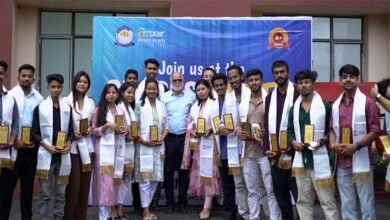Assam: Responsible use of online platform-The Legal Perspectives

Guwahati: Justice N. Kotiswar Singh, Judge, Gauhati High Court, Mr. Vijay Hansaria, Senior Advocate, Supreme Court of India and Member of National Legal Services Authority (NALSA) and Ms. Sneha Kalita, Advocate on Record, Supreme Court of India and Standing Counsel of Gauhati & Manipur High Court before Supreme Court were speakers on ‘Responsible use of online platform-The Legal Perspectives’ held by Royal Global University on 1 August 2020. They were joined in their deliberations by Prof.(Dr.) S.P.Singh, Vice Chancellor, Prof.A.K.Buragohain, Chairperson-Academic, Mr.P.J.Mahanta, Dean, RSHSS, along with faculty, staff and students of RGU as well as from across India. It was moderated by Ms.Kristi Saikia, Asst.Professor, Social Work department, RSHSS.
Prof.Singh, in his opening deliberation, humbly expressed gratitude for the illustrious presence of the speakers on a very pertinent topic creating awareness, especially during the pandemic. Cyber usage and crime has become an important aspect of every person’s lives as the pandemic has opened floodgates of virtual knowledge and also criminals who strike unsuspecting innocent people.
He hoped that with the New National Education Policy coming into force, the 64 kalas will be strongly imbibed into students. He hoped that students, faculty and participants will implement the information they receive from the webinar. Justice Singh, an erudite speaker, stated his delight to be amongst the students and participants. He stated that internet, mobile and social media is transforming the way in which people connect with each other and the manner in which information is shared and distributed related to authorization to speak on behalf of department/agency, technologies and platform to be used for communication, scope of engagement, creating synergies between different channels of communication, compliance with existing legislations etc., and guidelines/articles are in existence to take care of malafide use of it.
Cybercrime acts like online obscenity, identity theft, or financial malfeasance; the Internet enables extreme cases of criminality, hate speech, targeted fake news, illegal lobbying, and unprecedented thefts of personal data. A number of these cases involve online platforms and intermediaries, the new gatekeepers of the Internet. The concept that an intermediary is only a neutral pipeline for information is no longer sacrosanct.
Many countries abroad, new social media laws makes the social media platform liable for the content they carry, including the Indian Supreme Court and the Ministry of Electronics and Information Technology. In a country like India, where more than half a billion people have access to the Internet, it is important not to overlook the transformative potential of Internet access in India. He advocated less social media time and more outdoor activities.
Mr.Hansaria, a proud Assamese, spoke on the bane and boon of the internet and social media. He rued the fact that in get togethers, it is often seen people are more attached to phones then conversing with each other. In the present pandemic, virtual courts are working with judges accessing the court through the internet platforms from as far as London.
The easy access to social media has triggered the phenomenon where people invariably post information on social media without understanding its ramifications on facebook, twitter, pinterest, etc., and stated how the Information Technology Act, 2000, categorically makes one liable should any post of incriminating or illegal content or material is posted on social media.
He advised students and participants to be wary of sites, plagiarism, links or calls promising easy money or asking for personal data; respecting other’s privacy; avoid online addictive games but prodded all to spend quality time with family; use internet as an e-library; discuss social issues like Assam floods and quoted the Shreya Singhal case on duties of intermediaries. Ms.Kalita, spoke extensively on some of the cybercrimes, its threats and frauds in nature. Cyber stalking, different types of phishing attacks and how to file a complaint/report were some highlighted points of discussion.










